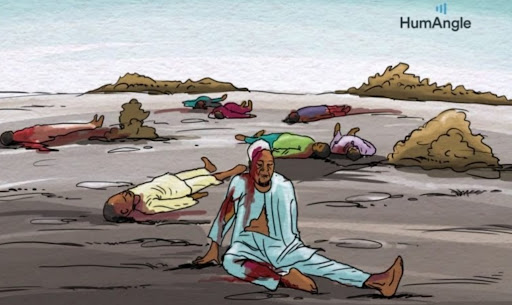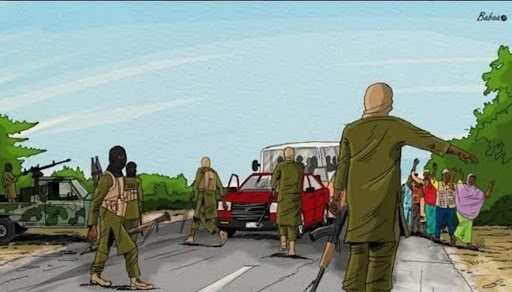Nigerians No Longer Complain About Basic Amenities; They Just Want To Live
As non-state actors now influence how Nigerians live their lives, some citizens are no longer concerned about basic amenities but in staying alive.

Alade Raheemat has not been to her hometown in Saki, Oyo State, Southwest Nigeria for five years and she’s not planning to leave Lagos anytime soon. She misses her parents and loved ones in the village but she is scared that her journey may end badly.
A petty trader at Obalende underbridge, she is barely struggling to make a living herself. Her fear is not the bumpy-jumpy road that leads to her village. It is not the lack of basic amenities such as potable water, sanitation, hospital, and many more.
Raheemat is simply scared that non-state actors now dictate how Nigerians live their lives. She has heard stories of kidnappings and how helpless residents are killed by various terror groups.

“I can’t leave Lagos now. I can’t risk my life traveling on Nigerian roads and then end up being a victim of kidnap. I have seen people saying it is not as bad as but that is not true. Tell me a place that the criminals have not taken over. My problem now is not about lack of basic amenities in my village but my safety.”
As insecurity persists in Nigeria, there are many other citizens who share the same fear with Raheemat. In fact, multiple sources in various local communities in Nigeria told our reporter that they would prefer to be alive in rural communities without basic amenities than risk their lives traveling to the city.
HumAngle has on several occasions reported how lack of basic amenities such as roads, schools, hospitals and clean water cause harm to humanity.

The International Organisation for Migration (IOM) in 2019 said 1.8 million men, women and children displaced in the northeastern part of Nigeria lack access to water, shelter and other vital resources that make life comfortable.
Meanwhile, the few ones available have been taken over by non-state actors. While some terror groups force the shutdown of the education system in the Northwest, Northeast and North-Central Nigeria.
Separatists are enforcing “sit-at-home” in the Southeast and those who disobey them are being killed and have their properties burnt. The insecurity situation is the same in the Southwest and South-South.
Insecurity affecting all sectors
Insecurity is a social problem that affects all major sectors of government and governance. It is a problem that affects the larger economic, political, and social patterns of a society.
“The country is sick of the basic development infrastructures like electricity to enhance the industrialisation of the nation in order to create employment opportunities,” Yemi Aliu, a lecturer at the department of economics in Obafemi Awolowo University, Ile-Ife, Osun State, said.
“The rate at which people are leaving the country now is alarming. Those who do not have money are even leaving Nigeria to nations like Ghana, Rwanda, and Ivory Coast. This is not just because of decaying infrastructure, it is because they cannot sleep with their two eyes closed.”

“No doubt, there is lack of stable electricity supply and endemic corruption, both of which impede their smooth operations but they don’t kill easily like the way terror groups are doing. Before we think of basic amenities, we must think about the safety of people. Nigerians’ lives matter, and only those alive would ask for basic amenities. For now, Nigerians simply want to stay alive.”
Speaking of this challenge, a Professor of international relations at Covenant University, Sheriff Folarin said in one of his essays that “the overused and poorly trained military is becoming less fit to fight insurgency, secure the borders or sustain the country’s previously enviable image.”
“The police secures little or nothing, is corrupt and inefficient and has become a big burden to the state. Ordinary citizens resort to legitimate self-help or criminal ways to survive. At home and abroad. No one cares. The image problem soars.”
Security and public safety experts have said at various times that the way forward to the endless security challenge is willingness of authorities and radical approach against corruption in the security sector cum the entire political space.
Support Our Journalism
There are millions of ordinary people affected by conflict in Africa whose stories are missing in the mainstream media. HumAngle is determined to tell those challenging and under-reported stories, hoping that the people impacted by these conflicts will find the safety and security they deserve.
To ensure that we continue to provide public service coverage, we have a small favour to ask you. We want you to be part of our journalistic endeavour by contributing a token to us.
Your donation will further promote a robust, free, and independent media.
Donate HereStay Closer To The Stories That Matter




